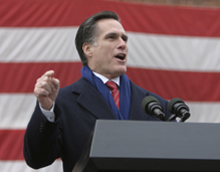Former Massachusetts Governor Mitt Romney is indisputably the front-runner for the Republican nomination for president. However, do Romney’s commanding leads in early primary states guarantee him a smooth path to the nomination? The answer is no.
 Unlike his hair, Romney’s campaign is not invincible. In the most recent fundraising quarter, he raked in $18.25 million. This puts Romney far ahead of fellow GOP candidates. Following Romney was Rep. Michele Bachmann, who raised over $5 million. Former MN Gov. Tim Pawlenty pulled in $4.2 million. It has been reported Former UT Gov. Jon Huntsman brought in 4.1 million in fundraising. (However, an estimated $2 million of Huntsman’s total comes from his own personal contribution to the campaign)
Unlike his hair, Romney’s campaign is not invincible. In the most recent fundraising quarter, he raked in $18.25 million. This puts Romney far ahead of fellow GOP candidates. Following Romney was Rep. Michele Bachmann, who raised over $5 million. Former MN Gov. Tim Pawlenty pulled in $4.2 million. It has been reported Former UT Gov. Jon Huntsman brought in 4.1 million in fundraising. (However, an estimated $2 million of Huntsman’s total comes from his own personal contribution to the campaign)
While these numbers may appear to bode well for Romney, he is actually behind his first fundraising quarter as a declared candidate in 2007. Pundits have also noted $18.25 million is half of what George W. Bush raised in his first quarter in 1999. Major GOP donors are not sold on Romney. Many of them may be holding out for a Rick Perry candidacy or waiting on another candidate to fully embrace the role of the anti-Romney candidate before committing their funds.
Thus far in the race, Romney is riding high on name recognition from the 2008 campaign. However, this is not necessarily an advantage for Romney at this point in the race. With Romney claiming over 80% name identification among Republicans according to Gallup, most have already formed an opinion about him. However, candidates like Huntsman and Pawlenty, for example, are within the 40’s and 50’s range respectively. This leaves them with tremendous potential to rise in the polls as more Republican voters get to know them.
At this point in the race, Romney does have one thing working in his favor; he polls the strongest of any of the GOP presidential candidates against President Obama. A few weeks ago, an ABC News/Washington Post poll actually put Romney up 3 points over Obama in a general election match-up.
However, Republican voters continue to have qualms about Romney’s candidacy. Much of the criticism points to one of his key legislative efforts, a healthcare reform law, which looks remarkably similar to Obamacare. Romneycare, like Obamacare, allows taxpayer funding of abortion and contains an individual mandate to buy health insurance.
In a speech at the University of Michigan, Romney emphasized the state versus federal distinction between the laws. Romney describes his law as “a plan for the state of Massachusetts” while Obamcare constitutes “a power grab by the federal government.” Also in his speech, he asserted, “the people in America are sovereign” and that the framers of the Constitution decided “the states would be the laboratories of democracy and compete with one another.”
As reliably as any other GOP presidential candidate, Romney can be counted on to repeal the pro-abortion Obama healthcare law. On his first day in office, Romney has pledged to “issue waivers for all 50 states” to opt-out of Obamacare.
While Romney has been rightly called out to clarify his position on healthcare, some have tried to unfairly skew his position on abortion. We are all well aware that Romney used to be pro-abortion. Both as a Senate candidate in 1994 and as Governor of Massachusetts, Romney professed to support a “woman’s right to choose.”
Romney has since repented of his Massachusetts sins. As a movement dedicated to protecting human life, we welcome anyone who shares that goal, no matter how long it takes them to reach that point. Even Ronald Reagan was not always pro-life.
While Governor of California, Reagan signed the Therapeutic Abortion Act of 1967. Six years before the Roe vs. Wade decision, which legalized abortion-on-demand, Reagan supported a bill that pushed the abortion envelope and laid the groundwork for the tearing down of pro-life laws nationwide.
Thankfully, Reagan shifted his position and became one of America’s most pro-life presidents. Romney, along with Herman Cain and Jon Huntsman, did not sign the “Pro-Life Pledge” of the Susan B. Anthony List, citing concerns over the broadness of its language. Some pro-life advocates jumped on him and drew all sorts of outlandish conclusions. Romney then released his own pro-life pledge, clarifying his pro-life position.
Romney promises to appoint pro-life judges, reinstate the Mexico City Policy, sign a federal Pain-Capable Unborn Child Protection Act, ban taxpayer funding of abortion and de-fund organizations like Planned Parenthood which perform and promote abortion. Beyond these promises, what more could a pro-life advocate ask for?
Voters may take issue with Romney for various other reasons, but the constant bantering back and forth questioning Romney’s stance on abortion does nothing but embolden the other side. The pro-abortion movement delights in our disunity.
Romney is far from clinching nomination but pro-life advocates should be wary not to mischaracterize his position in case he does ultimately become the nominee. This could greatly endanger general election prospects. And that goes for nearly the entirety of the field. All of the Republican candidates are pro-life, with the exception of pro-abortion former NM Gov. Gary Johnson. Attacking pro-life allies on abortion only aids the other side. Aside from overturning Roe vs. Wade, the most important goal of the pro-life movement has to be defeating Barack Obama, the most pro-abortion president in US history.







